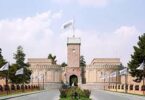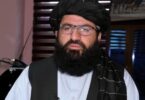KABUL (Tolo News): Abdullah Abdullah, the head of the High Council for National Reconciliation (HCNR), said that the US troop withdrawal from Afghanistan paved the way for the Taliban to increase the level of violence. Abdullah said that the Taliban is expanding the war and seeks to be the winner on the battlefield but it will not be able to dominate Afghanistan militarily.
The comments came at an event in Kabul organized by the Afghan Independent Human Rights Commission (AIHRC) and UN Women titled “Gender-Responsive Ceasefires.” “The Taliban used the opportunity (troop withdrawal) and tried to be the winner on the battlefield, and their day-and-night activity indicates this reality,” said Abdullah. “It is impossible for the Taliban to take over Afghanistan through war,” cautioned Abdullah.
Meanwhile, the UN also called on the Afghan warring sides not to lose the current opportunity for peace. Abdullah said the Taliban will be responsible for a “major historic loss” if they insist on fighting and reject the current opportunity for peace. “The Afghans have been pushing for a ceasefire since the start of the talks, the entire international community and the UN secretary general have called for a ceasefire,” Abdullah said.
Abdullah also praised the sacrifices of the Afghan National Security and Defense Forces (ANDSF). “We support these forces (ANDSF) who are the guardians of peace in the future and we should encourage their morale, we should avoid making them worry unnecessarily,” said Abdullah. “Ceasefire and ending hostilities are the fundamental demand of the people, expansion of violence shouldn’t obstruct efforts for peace,” said Shahrzad Akbar, the head of AIHRC.
Mette Knudsen, deputy special representative (Political) for Afghanistan in the United Nations Assistance Mission in Afghanistan (UNAMA): “Afghanistan has experienced a short period of respite during Eid ceasefires that have been put in place both by the Taliban and the government this year and the years past. These have been positive steps and gave some hope to people and a limited sense of safety, but they are definitely not enough and the violence remains unacceptably high,” she said. Meanwhile, Shahrzad Akbar, the head of the Afghan Independent Human Rights Commission (AIHRC), also said that the warring parties should stop further violence and make peace. Afghan women are worried about their future following a dramatic surge in the level of targeted attacks on women in recent months, said UNAMA.
Meanwhile, the Afghanistan Independent Human Rights Commission (AIHRC) and UN Women Afghanistan stated that gendered ceasefires are a prerequisite for peace talks and a negotiated settlement. In a joint statement issued, the organizations said that women across the globe have long been at the frontlines of conflict and crisis, pioneering ways to end the conflict, participating in peace, and advocating for the rights of women and girls in agreement seeking to end violent conflict.
“Yet often, women’s expertise and priorities are excluded from formal ceasefire agreements and implementation mechanisms. In Afghanistan, women continue to risk their lives every day in the name of peace,” the statement read. The organizations added that 2020 marked the highest number of women killed since the United Nations Assistance Mission in Afghanistan began systematic documentation in 2009.
Shaharzad Akbar Chairperson of the Afghanistan Independent Human Rights Commission stated: “Why are we talking about ceasefires and peace when the violence rates are so high? Because this is the common demand of all Afghans, across ethnicities, across genders, across geographies, across age groups: the end of war and ceasefire. From a human rights perspective, from all perspectives, this the biggest need, working for peace” The publication – Gender-responsive ceasefires and ceasefire agreements – was launched for highlighting how a gender-responsive ceasefire is urgently needed in the context of Afghanistan to secure the conditions for meaningful peace talks, the statement noted.
The publication outlines a practical set of recommended entry points for securing gender-related provisions in the ceasefire text as well as outlining how ceasefire agreements can address the gender dynamics of conflict, the organizations said. The publication was launched at an event in which Abdullah Abdullah, Chairperson of High Council for National Reconciliation; Hasina Safi, Acting Minister of Women’s Affairs; Habiba Sarabi, Member of Peace Negotiation Team of the Islamic Republic of Afghanistan; and Mette Knudsen, Deputy Special Representative of the US Secretary-General were present.
The event featured a collective call for a ceasefire from Afghan women across provinces and the international community in Kabul to put an end to all forms of violence, the organizations noted. “For the last 40 years, women have been the major victims of war. If we really want a ceasefire that lasts, we need women to be part of it and all their needs must be taken very well into consideration. Peace is what all Afghan people want. A just peace, a peace for all. A justified peace that takes the rights of all Afghans into consideration,” Abdullah Abdullah said.
“Today’s discussion, on gender provisions in ceasefire agreements, is very timely for Afghanistan. The need to reduce violence remains. Women are concerned that their rights will be at risk, they are concerned that the civil society space is shrinking. All Afghans, particularly women, are asking for an end to violence in all its forms,” said Mette Knudsen. Aleta Miller, a UN Women Representative in Afghanistan, stated that Afghanistan can lead the world on peace processes.
“Globally, peace processes say little or nothing about women’s rights, and statistically equality between women and men is a pre-requisite for long-lasting peace. Afghanistan can and should be different. But for any progress to happen, violence, in all its forms, must stop. It must stop now and forever, for any peace to happen, for any peace to last, for any progress.” Miller said.






